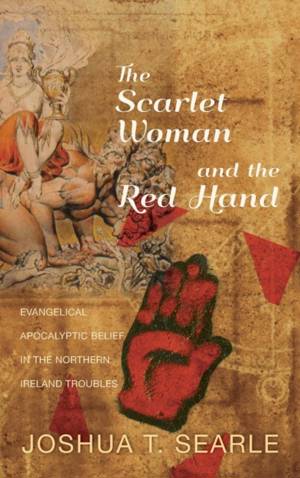
Je cadeautjes zeker op tijd in huis hebben voor de feestdagen? Kom langs in onze winkels en vind het perfecte geschenk!
- Afhalen na 1 uur in een winkel met voorraad
- Gratis thuislevering in België vanaf € 30
- Ruim aanbod met 7 miljoen producten
Je cadeautjes zeker op tijd in huis hebben voor de feestdagen? Kom langs in onze winkels en vind het perfecte geschenk!
- Afhalen na 1 uur in een winkel met voorraad
- Gratis thuislevering in België vanaf € 30
- Ruim aanbod met 7 miljoen producten
Zoeken
The Scarlet Woman and the Red Hand
Evangelical Apocalyptic Belief in the Northern Ireland Troubles
Joshua T Searle
Hardcover | Engels
€ 74,95
+ 149 punten
Uitvoering
Omschrijving
This book provides a comprehensive description of how evangelicals in Northern Ireland interpreted the "Troubles" (1966-2007) in the light of how they read the Bible. The rich and diverse landscape of Northern Irish evangelicalism during the "Troubles" is ideally suited to this study of both the light and dark sides of apocalyptic eschatology. Searle demonstrates how the notion of apocalypse shaped evangelical and fundamentalist interpretations of the turbulent events that characterized this dark yet fascinating period in the history of Northern Ireland. The book uses this case study to offer a timely reflection on some of the most pressing issues in contemporary negotiations between culture and religion. Given the current resurgence of religious fundamentalism in the wake of 9/11, together with popular conceptions of a "clash of civilizations" and the so-called War on Terror, this book is not only an engaging academic study; it also resonates with some of the defining cultural issues of our time.
Specificaties
Betrokkenen
- Auteur(s):
- Uitgeverij:
Inhoud
- Aantal bladzijden:
- 276
- Taal:
- Engels
Eigenschappen
- Productcode (EAN):
- 9781498269568
- Verschijningsdatum:
- 16/04/2014
- Uitvoering:
- Hardcover
- Formaat:
- Genaaid
- Afmetingen:
- 152 mm x 229 mm
- Gewicht:
- 539 g

Alleen bij Standaard Boekhandel
+ 149 punten op je klantenkaart van Standaard Boekhandel
Beoordelingen
We publiceren alleen reviews die voldoen aan de voorwaarden voor reviews. Bekijk onze voorwaarden voor reviews.









